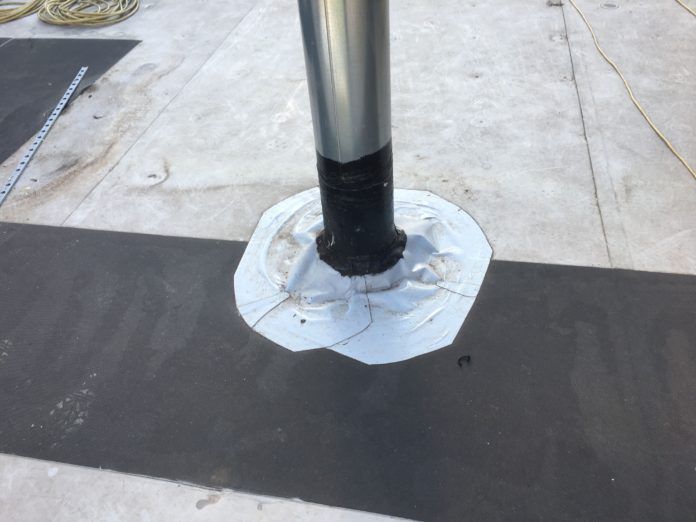A spokesperson from IKO explains when installing a waterproofing system, how important it is to follow guidance laid out by the manufacturer, as any divergence from this process could lead to costly repairs.
There is no such thing as a quick fix when it comes to a roof’s waterproofing installation. If installed correctly, modern high-performance waterproof systems – such as those supplied by IKO – will last the lifespan of a building.
We provide all the mechanisms to ensure this happens. From site support to specification guidance, drawings and quality materials; our expertise is available to customers to assure a project is brought to a successful conclusion.
Ultimately, however, an installer’s workmanship is key to getting the job right first time. This is achieved by following guidelines set out by the waterproofing system’s manufacturer, as any divergence from this process risks the prospect of a costly repairs programme later.
Budget constraints and the threat of financial penalties mean roof installers, as with many strands within the construction sector, are subject to increasingly tight project deadlines.
The pressure is on for contractors, but it must not lead to a relinquishing of standards in a race to the finish line. Focusing on a few basic tenets of roof waterproofing can ensure haste doesn’t compromise quality during installation.
Schedule for success
At IKO, our aim is to empower site managers by offering them the guidance and support to insist that the highest level of professionalism is always displayed during a roof’s waterproof installation. Before works commence, however, it’s important that a strategy is in place to avoid the programme clashing with other on-site trades.
Waterproof installers seldom get a roof to themselves, as they must often share workspace with scaffolders, for example. Therefore, for safety and practicality, a detailed works programme drawn up by the on-site trades can help projects run more efficiently.
Good preparation equals good practice
In terms of the waterproof installation itself, adhering to well-established common principles will do much to eliminate several avoidable issues. Typically, at the start of each day, good practice will involve testing welding equipment, for example, to make sure each heat gun is working correctly, and the correct power is installed on-site.
Pre-works preparation should also include ensuring all waterproofing materials are stored overnight in a dry place, whilst laid out and ready to use. Additionally, the roof’s substrate should be in a good condition and dry. It must also be cleaned, with any rubbish removed and bagged-up to avoid it being blown-off the roof.
Checks as you go
During an installation, laps and other details should be checked for water tightness. This is essential, as any ingress that goes undetected could lead to major issues – such as the waterproofing’s degradation.
Depending on the system being installed, there will also be several issues to consider. For a single-ply solution, this will mean being aware of the nozzle sizes needed to weld different areas of a roof (for flat surfaces such as the main roof area, it should be 40mm, for corners and detail 20mm).
Whilst for self-adhesive membranes, it ought to be borne in mind that a temperature of 5°C and rising is required for adhesives, primers and self-adhesive products to perform as required, and as manufacture recommendations listed on the data sheet.
To reiterate, following guidelines and data sheets plays a large part in waterproofing success, as is engaging with a roofing specialist such as IKO; because if you can’t find the answer you’re looking for, our teams are at the end of a phone to offer expert help and support.
May webinar
Getting a roof’s waterproofing right first time is the subject of IKO’s latest webinar. Aimed at roofing professionals and presented by our expert technical team, the presentation includes a more in-depth look at some of these highlighted issues to ensure good practice and successful roof installation.
IKO’s free-to-view webinar takes place on 25 and 27 May. To sign-up and for details on IKO’s monthly webinar programme, click here.




